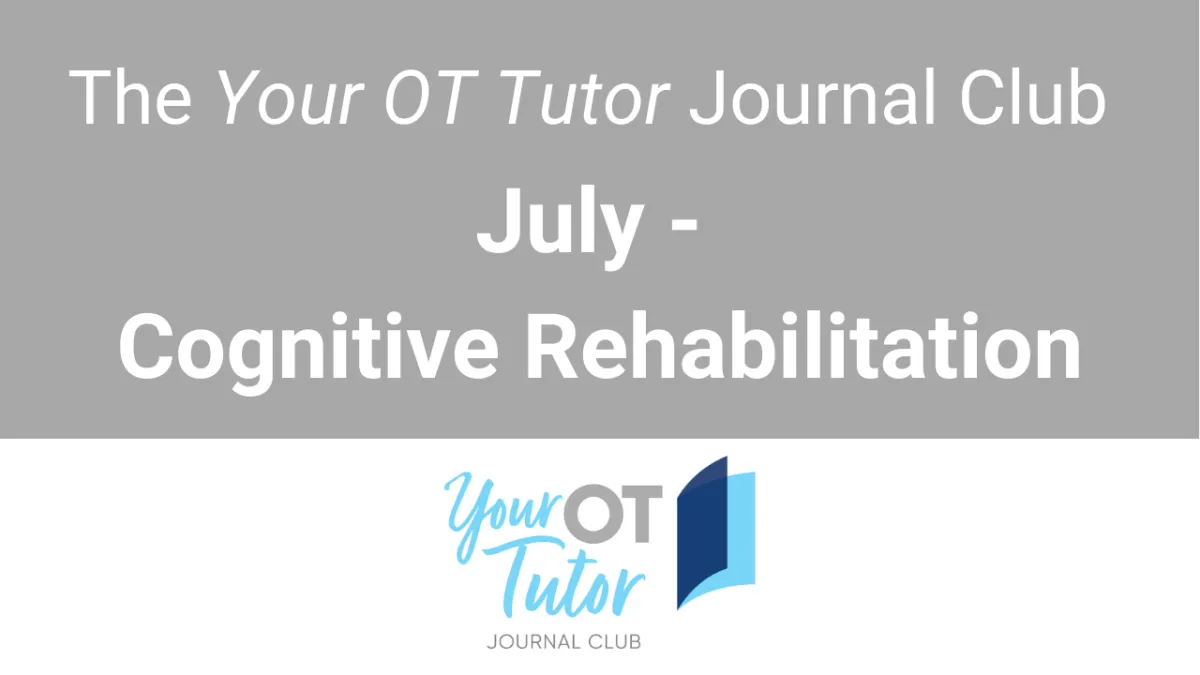
CPD for OTs - Cognitive Rehabilitation
The Your OT Tutor Journal Club - The Journal Club you've been waiting for!

The details you need to know...
1. What article did we discuss? We reviewed and discussed the INCOG 2.0 cognitive rehabilitation clinical practice guidelines - Part V (Memory). The authors completed a systematic review of the available literature related to the cognitive rehabilitation of memory impairments for adults post moderate to severe TBI and created a list of evidence-based recommendations. These related to strategies such as the use of internal strategies, environmental supports, cognitive skills training and groupwork.
2. What ‘Research Fundamentals’ tip was covered in this session? We covered an overview of the different types of research studies included in this review (e.g. what is a systematic review, or cohort study), including discussing the strength of each study design.
3. What were the key points from the article critique? We used the AGREE II checklist. The study purpose was clear, a range of professionals were included in the development team, and a thorough search strategy was used to locate the articles included in the review. The recommendations were specific and clearly presented, and an algorithm and audit tool were also provided to enhance clinical utility. Gaps in the methodology include no reference to whether consumers were consulted at any stage, and there was no clear description of how individual studies were critiqued, or how they reached a consensus on the recommendations.
4. What were some of the key take home messages from the discussion? It is important to consider a range of factors when determining what treatment approaches are likely to be effective for improving memory impairments post moderate to severe TBI. The person's premorbid function, comorbidities and severity of injury should be considered, and the person's carer or family should be included in therapy to ensure carry over of the strategies utilised. Treatment approaches are most effective when they are targeted towards client-centred goals, with a clear focus on functional activities.
5. How are OTs going to use what they learnt in this session? Some OTs were planning to investigate options for evaluating the effectiveness of external assistive devices that they prescribe (e.g. standardised outcome measures). Other were planning to upskill on approaches such as errorless learning and internal memory strategies, which may be able to be applied with a range of clients within their caseloads.
You can now purchase a recording of the session, along with a range of downloadable resources. Your access to this content won’t expire, so you can revisit it at any point in the future.
SOUND INTERESTING? SIGN-UP TODAY!
You'll get unlimited access to the content so you can revisit it whenever you need to.
If you are an OT student, my mission is to turn you into proud #OTNerds that love evidence-based practice and learning, so you can access this content for FREE! Click on the button below and send evidence of your student status and you'll be given access ASAP!
If you are an Occupational Therapist (or other interested health professional - all are welcome), click on the button below to make your purchase for $25. You'll receive immediate access to the preparation resources via the Your OT Tutor Learning Management System!
Turns out this session isn't for you, but you're still interested in being added to the Your OT Tutor mailing list? Add your details by clicking on the button below to stay up to date with the latest Your OT Tutor resources and courses.